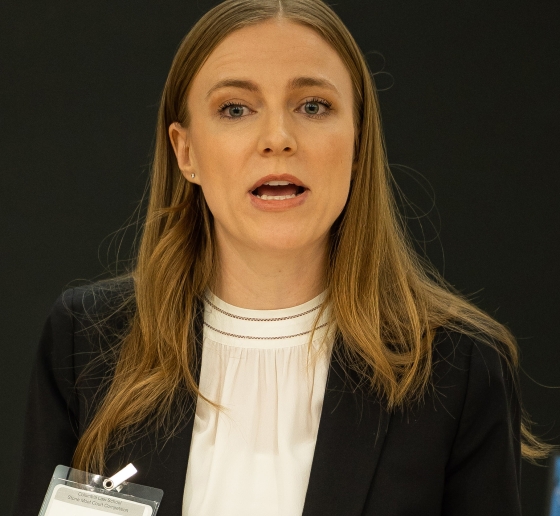Student Spotlight: Abigail K. Flanigan ’23
Flanigan is a finalist in the 2023 Harlan Fiske Stone Moot Court Competition.

Having a background in piano performance and in library science has come in handy for Abigail K. Flanigan ’23 as she hones her oral and written advocacy skills at Columbia Law School: She has worked as a research assistant, served as essays editor for the Columbia Law Review, and is (as of March 2023) preparing to compete as a finalist in the Harlan Fiske Stone Moot Court Competition.
Hometown: Salt Lake City
Education: B.M. in piano performance, University of Illinois; M.S. in library science, University of North Carolina
Before Columbia Law: Spent more than three years as a research librarian for the University of Virginia specializing in music- and performing-arts-related inquiries
At Columbia Law: James Kent Scholar; Harlan Fiske Stone Scholar; Columbia Law Review essays editor; Columbia Journal of Gender and Law staff editor; teaching assistant to Christina D. Ponsa-Kraus, George Welwood Murray Professor of Legal History; research assistant to Kate Andrias, Patricia D. and R. Paul Yetter Professor of Law; Harlan Fiske Stone Moot Court finalist
After Columbia Law: Litigation associate at Jenner & Block in New York
How did you get from library science to the law?
I was a really serious pianist my whole life. I didn’t think about majoring in anything else. But at the end of college, I realized I wanted to do something else long term, something that would use a different part of my brain. I had so much appreciation for libraries as an institution in our society, and library science seemed like a good fit: research, writing, public service. But I discovered that librarianship wasn’t quite right for me.
Has your background in library science been helpful in law school?
I would say it is the one leg up in law school that I have! Part of what you learn as a librarian is how to use research tools effectively. That is what I was an expert in and have been able to apply to the law. Generally, I feel I am quite good at tracking down what needs to be tracked down.
What do you enjoy most about the Columbia Law community?
My first year was entirely online—I was in Virginia—but there was a sense of community among my section. We had a group chat that everybody was active in, and I made several friends that year.
Since then, the biggest thing for me has been Columbia Law Review. I’ve learned so much working with faculty and being exposed to such a wide swath of scholarship. That community has been really incredible.
What do you enjoy about moot court, and has your background as a performer helped you?
I much prefer when there are a lot of questions [during moot court]. I like having to think on my feet and respond. Time goes by pretty quickly when you’re up there. You answer one question, then another, and you get into a flow.
As a pianist, I got horrible performance anxiety. But when I worked at the University of Virginia, I sometimes played as an accompanist, and I found out that I like performing a lot more if someone else is on stage with me. Moot court is like that—you’re interacting with someone else. It’s not all focused on you.
What do you like most about living in New York City?
It was a bit of a shock to the system after living in Charlottesville for four years. I like trying different restaurants, going to see Broadway shows—I just saw Some Like It Hot. What’s fun about being in New York is that lots of friends and family come to visit. It’s exciting for everybody to have a reason to be here.
Any advice for incoming Columbia Law School students?
There’s so much to do in law school that you can feel like you’re missing out, but you can also overload yourself by trying to do too much. Try to strike a balance: Try out new things you think you might be interested in, and don’t do things just because you think you’re supposed to.
This interview has been edited and condensed.